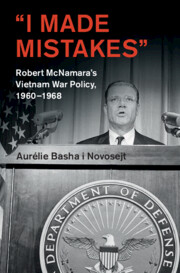Acknowledgments
Every story has a long and short version. The long version of the story behind this book begins in 2002 when I met the man at the center of this research, Robert S. McNamara. Many people, too many to acknowledge here, have contributed to the journey that led to my doctoral work and ultimately to this book. In the shorter version, I am especially grateful to Steven Casey, Andrew Preston and MacGregor Knox. This book would not have been possible without their encouragement, inspiration and mentorship as well as their critical eye. My special thanks also go to Marc Selverstone and Peter Trubowitz, who offered their invaluable comments and perspectives.
I benefited from two particularly collegial and intellectually stimulating summer workshops that shaped the direction of my research: Columbia University’s Saltzman Institute for War and Peace Studies’ Summer Workshop of Military Operations and Strategy and the University of Texas at Austin’s Clements Center’s Summer Seminar in History and Statecraft. Special thanks are due to Kori Schake, Elliot Cohen, Mark Atwood Lawrence, Jonas Hagmann and Lisa Karlborg.
Many other colleagues whose work I admire provided important advice and support. They include the late Stanley Hoffmann, Fredrik Logevall and Lawrence Kaplan. John Dumbrell, Mara Oliva and Kasper Grotle Rasmussen were the best co-panelists one could wish for on two occasions. Errol Morris and Daniel Ellsberg were unusually generous with their time and insight. Alex McNaughton and Tom Paulin kindly shared the McNaughton diaries and their time. Diego Ruiz-Palmer made military jargon comprehensible. The Historical Office of the Office of the Secretary of Defense kindly allowed me to draw on their impressive collection of photographs.
In addition, thank you to Jeremy Schmidt and Tim Holtz at the Gerald R. Ford Presidential Library and to Stephen Plotkin at the John F. Kennedy Presidential Library, who helped to make my research trips as enjoyable as they were. My research would not have been possible without financial support from a Marjorie Kovler Fellowship from the John F. Kennedy Presidential Library Foundation, a George C. Marshall/Baruch Fellowship from the George C. Marshall Foundation, a Gerald R. Ford Presidential Library Research Travel Grant and a Roosevelt Study Center Research Grant.
I owe a debt of gratitude to my students and colleagues at the London School of Economics. My students sustained my enthusiasm, with a special nod to Shreya Das and Uday Mehra. The LSE100 team provided an exciting intellectual home for many years. My deepest thanks go to Andrea Mason, Diego De Merich, Daniel Strieff, Mahon Murphy, Jonas Gjersø, Tobias Vogelgsang, Jessica Templeton, Jose Olivas-Osuna, Maria Chen, Bryan Gibson, Maria Brock, Dayna Barnes, Taylor Sherman and Maria Kyriakidou.
Debbie Gershenowitz took a leap of faith in backing this book. I am grateful to her and her colleagues at Cambridge University Press for their help in making this book a reality.
Finally, my family and friends provided the perspective and cheer that I needed over the years, including Sarah Basha, Jerry Mitrovica, Laura De Kock, Almudena Suarez-Fernandez, Benjamin Grenier, Talal Salman, Kostas Matakos, Joop ter Harmsel, as well as the Glucksman and van Vollenhoven families.
My son Arendt was born halfway through the process of producing this book and changed everything for the better, except for the quality of my sleep. I am immensely thankful to Cidalia de Pina Macedo for helping me know that he would be happily taken care of while I could get back into my other world. My husband Olivier van Vollenhoven, the love of my life, has been my partner in every sense of the word. And finally, my parents Ydriz and Kimete Basha i Novosejt have been my greatest source of strength and motivation. I dedicate this book to my father, who relished the idea that his daughter was a history teacher as de Gaulle had been but never got to hold these pages in his comforting hands.

